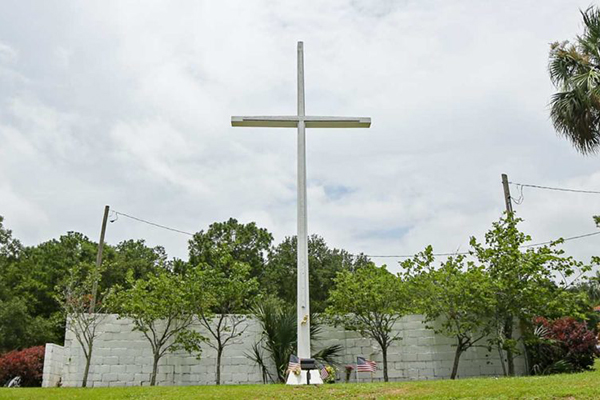A federal appeals panel ruled reluctantly Sept. 7 that a 34-foot cross standing in a public park in Pensacola, Florida, since 1941 must come down.
A three-judge panel of the 11th Circuit U.S. Court of Appeals upheld a lower court decision ordering removal of the Bayview Cross in a lawsuit filed in 2016 by the American Humanist Association and the Freedom From Religion Foundation.
Bound by precedent
The judges said they were bound by precedent from a 35-year-old opinion that a similar display at a state park in Georgia lacked a “secular purpose” — thereby violating the Establishment Clause of the First Amendment to the U.S. Constitution — but two of the three said the previous case was wrongly decided and should be reconsidered.
In 1983 the 11th Circuit ruled that a lighted cross in Black Rock Mountain State Park in north Georgia violated the Establishment Clause. While “constrained to affirm” that precedent, the judges in the Pensacola case said more recent decisions by the U.S. Supreme Court suggest that it should be overturned.
The earlier case relied on Lemon v. Kurtzman, a 1971 landmark Supreme Court opinion establishing a three-prong test for legislation concerning religion.
According to the “Lemon Test,” such statutes must have a secular legislative purpose, must not have a principal or primary effect of advancing or inhibiting religion and must not result in excessive entanglement between church and state.
While the cases are similar, the judges in the Pensacola case said more recent Supreme Court decisions — including a 2014 ruling upholding a New York town board’s practice of opening its meetings with sectarian Christian prayer — have “substantially weakened” the Lemon Test, described by one judge as the “sanitization of any evidence of religion in the public sphere.”
The American Humanist Association and the Freedom from Religion Foundation called the decision “a resounding victory for the First Amendment’s principle of church-state separation.”
Becket, a Washington-based nonprofit, public-interest law firm that specializes in cases involving the free exercise of religion that is representing the city of Pensacola, said the city plans to appeal.
“The Constitution doesn’t require the government to scrub every religious symbol from the public square,” said Luke Goodrich, vice president and senior counsel at Becket. “The Supreme Court has repeatedly said that the government can recognize religion as a fundamental part of our history and culture, and we’re glad that the majority of the court agreed that the cross is constitutional.”
‘Preeminent symbol’
The Baptist Joint Committee for Religious Liberty joined Americans United for Separation of Church and State in a 2017 brief arguing that Pensacola’s display of “the preeminent symbol of Christianity” on public property sends a “clear, unequivocal message to communicate governmental favoritism for Christianity.” (BNG)






Share with others: